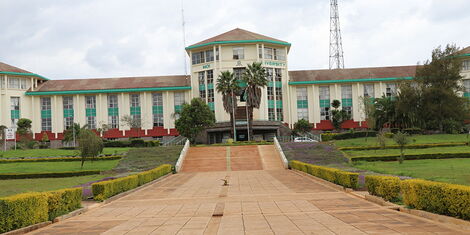The Ministry of Education has announced key changes to the Moi University Council, signaling a fresh start for the institution amid ongoing financial and operational challenges. Education Cabinet Secretary Julius Ogamba, through a gazette notice dated Friday, January 17, appointed Noah Midamba as the new Chairperson of the university’s council.
Alongside Midamba, Ronald Wasike, Mercy Nyambura Kanyara, Edward Sambili, and Anne Weceke Makori have been named as council members, with their three-year terms taking effect immediately.
This reshuffle comes at a critical time when Moi University has faced mounting criticism for its failure to address issues affecting both its staff and students. The outgoing council members—Humphrey Kimani Njuguna, Clara Momanyi, Christopher Khaemba, Eusilah Ngeny, and Susan Aletia—were relieved of their duties as the institution seeks to adopt a new direction under the leadership of Midamba and his team.
Noah Midamba brings a wealth of experience to his new role, having previously served as Vice Chancellor of KCA University for over a decade until his departure in 2021. His tenure at KCA University is remembered for fostering academic excellence and institutional stability, qualities that will be instrumental in addressing Moi University’s current challenges.
While announcing the appointments, CS Ogamba expressed confidence in the new leadership’s ability to turn around the institution. “In exercise of the powers conferred by section 36 of the Universities Act, as read together with section 51 of the Interpretation and General Provisions Act, the Cabinet Secretary for Education appoints Noah Midamba,” read part of the gazette notice.
The leadership change comes on the heels of intense protests by the University Academic Staff Union (UASU) over delayed salaries and unfulfilled agreements. In a January 10 notice, UASU directed Moi University lecturers to stay away from their workstations until grievances were addressed.
According to UASU Secretary General Nyabuti Ojuki, the institution had failed to pay staff salaries for over two months, exacerbating financial hardships for workers and stalling academic activities. “All universities have implemented the national Collective Bargain Agreement (CBA) and paid salaries after receiving money from the national treasury, but at Moi, nothing has changed,” Ojuki lamented during a press conference.
Ojuki further criticized the institution for its failure to honor commitments made in the return-to-work formula signed last year. “We are wondering why Moi University is the black sheep among all the universities in the country. They do the opposite and cause suffering to lecturers and students,” he added.
After a week of protests, the Moi University administration released Ksh113 million on January 16 to settle November and December salaries, easing tensions among staff. However, the underlying issues of financial mismanagement and delayed implementation of the CBA remain unresolved, casting a shadow over the institution’s future.
Midamba’s appointment marks a potential turning point for Moi University. His proven track record as an administrator will be tested in addressing the institution’s systemic challenges. The new council is expected to prioritize resolving financial instability, improving employee welfare, and restoring confidence among students and stakeholders.
As one of Kenya’s leading public universities, Moi University has faced a decline in its reputation due to financial mismanagement and operational inefficiencies. Staff protests, delays in salary payments, and unmet contractual obligations have disrupted academic programs and dampened morale. These challenges underscore the urgent need for strong leadership and effective governance.
CS Ogamba emphasized the importance of collaborative efforts in steering Moi University toward recovery. The new council is expected to work closely with the Ministry of Education, the National Treasury, and other stakeholders to address the institution’s financial challenges. Enhancing transparency and accountability will be key to restoring public trust and ensuring the university fulfills its mandate as a center of academic excellence.
The task ahead for Midamba and his team is formidable but not insurmountable. With a focus on financial reforms, adherence to collective bargaining agreements, and fostering a conducive environment for learning and teaching, the new leadership has an opportunity to redefine Moi University’s legacy.
For the university community, the appointment of a seasoned leader like Midamba offers a glimmer of hope amid challenging times. As the new council takes charge, all eyes will be on their ability to implement lasting solutions and usher in a new era for Moi University.





